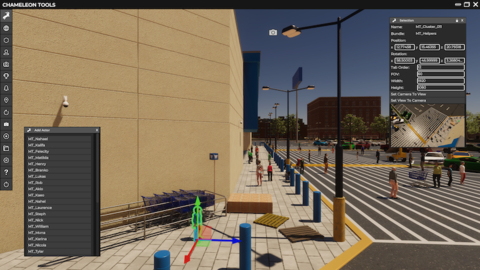Mindtech Launches New Series on Synthetic Data - The Go-To Guide for Anyone Training AI to See and Understand Our World
Mindtech Launches New Series on Synthetic Data - The Go-To Guide for Anyone Training AI to See and Understand Our World
*Guide Provides Industry Analysis on Synthetic Data, Practical Tips for Data Engineers and Real-World Use Cases For Data Training**
**Part One Reveals How Synthetic Data Resolves Visual AI’s Training Problems**
SHEFFIELD, England--(BUSINESS WIRE)--Mindtech Global, developer of the world’s leading platform for the creation of synthetic data for training AI, has today launched its first guide on how to use synthetic data to resolve visual AI’s training problems.
From retail to law enforcement, and from healthcare to driverless cars, data scientists the world over are developing powerful visual AI applications that are bringing the benefits of deep machine learning networks to a whole swathe of industries.
However, trouble is stalking visual AI’s brave, new world. A clutch of problematic, real-world data acquisition issues – collectively amounting to what’s being called a data roadblock – are holding up the advancement of visual AI.
The answer to these data roadblocking issues, however, is a relatively simple one: visual AI developers need to augment what real-world data they can acquire with as much synthetic data as they can generate.
Using Chameleon, Mindtech’s synthetic data creation platform, users set up a scene of buildings and environments, and then import all the assets relevant to their application – which could be anything: people, bicycles, cars or crowds in which people mill in multiple directions (with collision detection). They then set up activities, events and “what if” scenarios that will generate images to be captured by one or more virtual cameras in a series of simulation runs – the images that will ultimately form the basis of the data used to train a user’s AI.
Benefits of creating training data this way include it arrives perfectly annotated, privacy-compliant, and ready to use by machine learning engineers and/or data scientists – with no need for 3D graphics expertise on the part of the user.
Chris Longstaff, VP Product Management, Mindtech Global said,
“AI models are infamous for fragility – throwing up bizarre, unexpected results due to the fact that they sometimes generalize from incomplete datasets, or a fault with the model design. For that reason, a synthetic data platform must be capable – as Chameleon is – of reproducing a dataset it once generated at a later time, should anyone need to forensically check why an ML model in development needs troubleshooting.
That key error checking capability ensures those tasked with training AI models can have as much faith in synthetic data as they currently do in real-world data – perhaps even more.”
You can read the full guide on how synthetic data resolves visual AI’s training problems here: https://bit.ly/3Pp0RY1
Ends.
Mindtech Global www.mindtech.global
Mindtech Global is the developer of the world’s leading end-to-end ‘synthetic’ data creation platform for the training of AI vision systems. The company’s Chameleon platform is a step change in the way AI vision systems are trained, helping computers understand and predict human interactions in applications ranging across retail, smart home, healthcare and smart city.
Mindtech is headquartered in the UK, with operations across the US and Far East and is funded by investors including Mercia, Deeptech Labs, In-Q-Tel and Appen.
Contacts
Cat Lenheim
cat@thoughtldr.com
+44 203 417 0717 / +44 7511 117587

